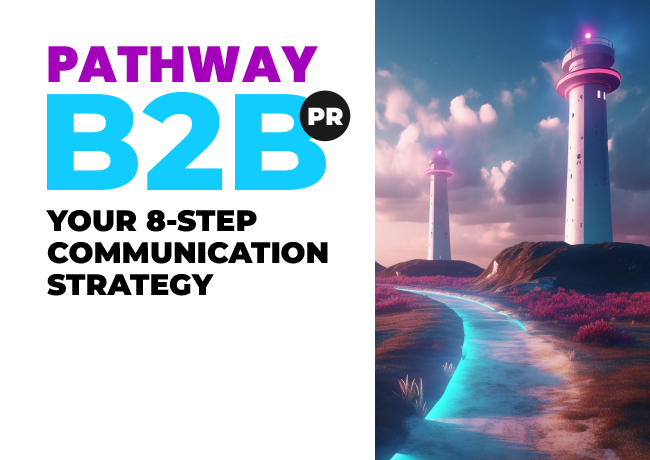Six reasons why you need a communication strategy
Marketing plays an integral role in the business’s growth, but without a clear communication strategy, money is being wasted and it’s impossible to be consistent and efficient.
Without a communication strategy, CMO’s are expected to deliver whilst working in a vacuum, whereas in our experience, CMO’s with a communication strategy can lead the business with greater confidence and authority. In fact, one of our clients, 2i, credited the development of a communication strategy with delivering 18 new benefits which included winning new business.
Put simply, a communication strategy saves you money and time whilst accelerating brand awareness and lead generation. Here are six compelling reasons why every business should have one.
Key takeaways
- Empowers leadership: A communication strategy enables CMOs to lead with confidence, aligning teams and providing clarity of purpose.
- Enhances focus and efficiency: By defining priorities and avoiding distractions, a communication strategy ensures time and resources are used effectively
- Drives targeted messaging: It helps craft tailored messages that resonate with audiences at every stage of the buying journey.
- Serves as a strategic roadmap: It provides a clear framework for decision-making, helping businesses stay on track to achieve their long-term goals.;
- Provides clear direction: makes it easy to achieve objectives efficiently.
- Amplifies marketing impact with integrated PR: strengthens messaging consistency, boosts brand awareness, and drives measurable results.
1. Lead your business with confidence
As a CMO you need a comms strategy because it will make your job easier and more rewarding, it will also help you to lead the business and perform your duties at a higher level.
The nature of being responsible for a company’s marketing means you must respond to multiple demands from the business. This can lead to a kind of tactical myopia. Your colleagues in sales will demand qualified leads – and rightly so – but if you haven’t got a mutually agreed understanding of your target sector priorities and a tight definition of your target personas, then the likelihood for disagreement or disappointment is almost inevitable.
2. Provides focus and efficiency
A well-formed comms strategy keeps you both focused and aligned. It ensures you are more efficient, by focusing your time and money on the strategic priorities. The natural optimism, energy and opportunism characteristic of salespeople means that they can be distracted by whoever or whatever appears to be a quick win.
A well-defined communication plan determines which sectors present the lowest hanging fruit; so that you can prioritise them. That’s not to say low-hanging fruit shouldn’t be picked if it falls outside the specified target – but it must be recognised for what it is and should not distract everyone from the wider strategic intent.
Low-hanging fruit should be picked if it falls outside the specified target – but it must be recognised for what it is and should not distract everone from the wider strategic intent.
A comms strategy provides a yardstick by which every effort and initiative can be assessed for efficacy. Everyone needs to understand when the pursuit of low hanging fruit has turned into an unhelpful distraction and drain on resources. If you own a comms plan, this will be as clear as the nose on your face.
3. Results in more effective messaging
Your target audience will rarely comprise a disciplined cohort equipped with all the information they need to select your products and services. Your audience is most likely made up of broad groups of people, with similar sets of responsibilities, who are at different stages of the buying cycle. They are probably ill-informed, confused and/or insecure in their knowledge or options. Creating typical, representative personas helps to focus attention and effort.
Your audience is most likely made up of broad groups of people… who are at different stages of the buying cycle.
Furthermore, understanding that your target persona will be at different stages of the buying cycle enables you to develop messaging which talks to their individual information needs, while addressing their fears, motivations and irritations. This approach, which respects your target audiences’ differences, will be more persuasive because you are telling them things that matter to them in a way that helps them to move along their buying journey.
4. Serves as a roadmap
Your comms strategy captures your sales needs, sector priorities, personas, positioning and messaging. It provides you, and your extended team and colleagues, with many of the essential tools you need to enable you to deliver your business objectives. For example, It defines your value proposition – stipulating why your brand is more desirable than an alternative.
I’m a great believer in active decision-making. The process of formulating your comms strategy will enable you to identify knowledge gaps. Then, you can decide whether you need to secure the missing information or not. It’s important to recognise and understand the implications of your action or inaction so that outcomes don’t come as a surprise – forewarned is forearmed.
5. Brings clarity of purpose
Whatever your objectives and whatever your requirements, a communication strategy just makes the process of getting there more efficient, more effective and the journey so much more rewarding. Having clarity of purpose also allows you to lead the business, fend off unnecessary or irrelevant requests and direct your resources with intent.
A communication strategy makes the process of reaching your objectives more efficient, more effective and the journey so much more rewarding.
6. Unlocks the potential of integrated PR
So, where does PR fit into all of this and why am I writing this article?
My view is that the most effective type of PR is PR that is fully integrated; it is wrapped around the marketing activity to create impact and effect. The most effective type of PR follows a clearly defined plan, speaking to people about the things they care about in a tone that engages and persuades. We can only do this properly if there is a clearly defined comms strategy… and so, we arrive full circle.
Communication strategy – the questions it answers
Who are you going to engage with?
Why your audiences should listen
How will you deliver your business plan?
What makes your brand unique?
What channels should you use?
(click on each box for more insights)
A well-designed communication strategy is a blueprint for success. It enables CMOs to lead with authority, align teams, and craft messaging that converts.
If your goal is to increase brand awareness, strengthen your competitive position, command share of voice and accelerate sales, start by downloading our B2B PR guide: Your 8-Step Communication Strategy Guide

Your 8-Step Communication Strategy Guide
A comprehensive guide to delivering your business goals using intelligent and relevant messaging.
Subscribe to our updates
Stay up to date with the latest insights, case studies and PR guides.

